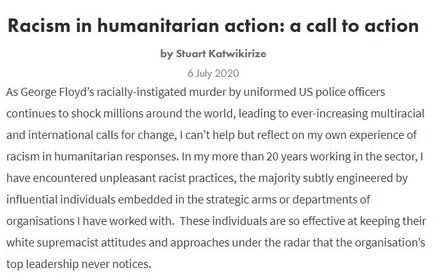
As George Floyd’s racially-instigated murder by uniformed US police officers continues to shock millions around the world, leading to ever-increasing multiracial and international calls for change, I can’t help but reflect on my own experience of racism in humanitarian responses. In my more than 20 years working in the sector, I have encountered unpleasant racist practices, the majority subtly engineered by influential individuals embedded in the strategic arms or departments of organisations I have worked with. These individuals are so effective at keeping their white supremacist attitudes and approaches under the radar that the organisation’s top leadership never notices.
